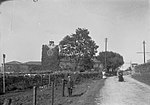Llanvihangel (or Llanfihangel) Court, Llanvihangel Crucorney, is a Tudor country house in Monmouthshire, Wales. The architectural historian John Newman, in his Gwent/Monmouthshire volume of The Buildings of Wales series described the court as "the most impressive and richly decorated house of around 1600 in Monmouthshire". The origins of the house are medieval, with a traditional date of construction of 1471. The building was given its present appearance by a substantial enlargement and re-casing of circa 1600 by Rhys Morgan, of the family of the original owners. In the very early 17th century it was owned briefly by Edward Somerset, 4th Earl of Worcester.
In 1627 it was purchased by Nicholas Arnold and was further extended by him and by his heir John. Nicholas Arnold was a noted horse-breeder as well as Member of Parliament for Monmouthshire and was responsible for the construction of the Stable Block at Llanvihangel. His son was a notorious anti-Papist and Llanvihangel became a centre of the campaign against Monmouthshire recusants.
The court had a number of owners in the 18th, 19th and 20th centuries, including the Earls of Oxford and Earls Mortimer. It remains a private house that is occasionally opened to the public and is a Grade I listed building. The stable block has its own Grade I listing, and the garden house, originally one of two on the site of a former walled garden, is listed Grade II*. The gardens at Llanvihangel are listed at Grade I on the Cadw/ICOMOS Register of Parks and Gardens of Special Historic Interest in Wales.











